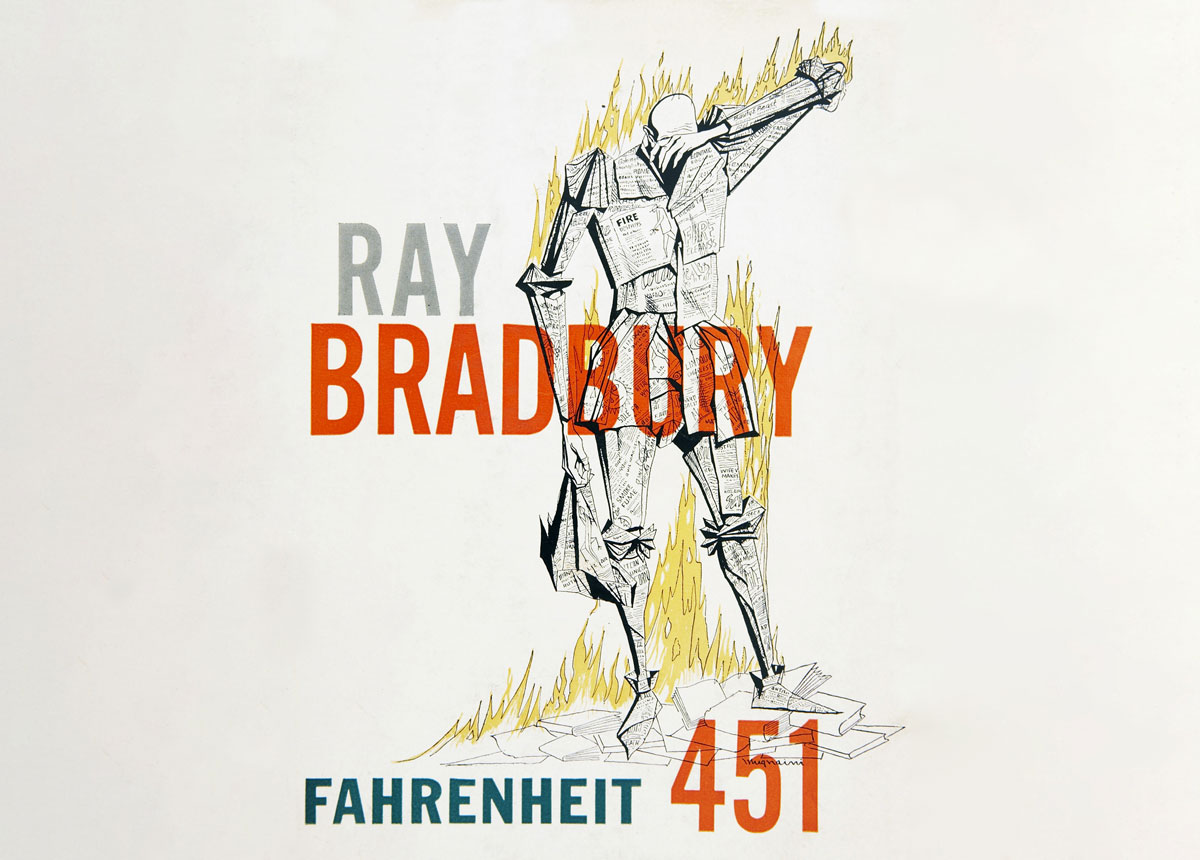FAHRENHEIT 451
Author: Ray Bradbury
Original date and place of publication: 1953, United States
Original publisher: Ballantine Books
Literary form: Novel
SUMMARY
Fahrenheit 451 relates the story of an oppressive society in which books are forbidden objects and firemen are required to bum all books they encounter. The novel, an expanded version of a 1950 story entitled “The Fireman,” takes its title from the temperature at which paper ignites: 451°F. One of a number of dystopic novels published after World War II, the work portrays humans as having lost touch with the natural world, with the world of the intellect, and with each other. As the fire captain observes, “the word ‘intellectual’ became the swear word it deserved to be.”
People hurry from their homes to their workplaces and back, never speaking of what they feel or think but only spouting meaningless facts and figures. At home, they surround themselves with interactive picture walls, wall-size television screens on three walls (four walls if one can afford them) containing characters who become accepted as family in an otherwise unconnected life. The streets have become dangerous as minimum speed limits of 55 miles per hour must be maintained, and speeds well over 100 miles per hour are more common. Teenagers and daring adults race their cars through the streets without concern for human life. War with an unnamed enemy is imminent.
For one fireman, the realization that there is a better life comes in the form of a 17-year-old girl named Clarisse, whose appreciation of nature, desire to talk about feelings and thoughts, and appreciation for simply being alive mark her as an “odd duck.” Guy Montag likes his job as a fireman, but he has clandestinely taken books from several sites where he and his fellow firemen have burned books and the houses in which they were hidden. Clarisse’s questions as to why Montag became a fireman and her observations that the job does not seem right for him are disconcerting. A call to burn the books and house of a woman who refuses to leave the premises and, instead, ignites herself with the books increases Montag’s discontent. He tries to speak with his wife, Mildred, but she blocks him out with her Seashell ear thimbles, tiny radios worn in the ear that play continuously, and her involvement with her “family” on the picture walls.
Montag learns that the major reason for the abolition of books was to keep everyone happy. His fire captain explains that without books there is no conflicting theory or thought, and no one learns anything more than anyone else. With books, “Who knows who might be the target of the well-read man?”
After his wife reports that Montag has books in the house and their home is destroyed by the firemen, he seeks the help of former English professor Faber, who is part of a broader movement to preserve the knowledge of the past. Following Faber’s directions, Montag goes to the railroad yards, where he meets a group of old men, all former university professors who have each memorized specific literary works. They claim to be part of a network of thousands of individuals who will keep literature alive in their heads until the time when the oppression ceases and they can set the literature in type once more. Montag, who has memorized several books of the Old Testament, joins them, and the novel ends on a hopeful note.
CENSORSHIP HISTORY
Fahrenheit 451 is an indictment of censorship and expurgation, so the fact that this book was expurgated and marketed by the publisher that way for 13 years before the author became aware of the abuse is particularly ironic. In 1967, Ballantine Books published a special edition of the novel to be sold in high schools. Over 75 passages were modified to eliminate such words as hell, damn, and abortion, and two incidents were eliminated. The original first incident described a drunk man who was changed to a sick man in the expurgated edition. In the second incident, reference is made to cleaning fluff out of the human navel, but the expurgated edition changed the reference to cleaning ears. No one complained about the expurgation, mainly because few people were aware of the changes and many had not read the original. The copyright page made no mention of the changes, but thousands of people read only this version of Fahrenheit 451 because the edition ran to 10 printings. At the same time, Ballantine Books continued to publish the “adult” version that was marketed to bookstores. After six years of the simultaneous editions, the publisher ceased publication of the adult version, leaving only the expurgated version for sale from 1973 through 1979, during which neither Bradbury nor anyone else suspected the truth.
In 1979, a friend alerted Bradbury to the expurgation, and he demanded that Ballantine Books withdraw completely the expurgated version and replace it with his original. The publisher agreed, and the complete version has been available since 1980.
This act of censorship had far-reaching effects for authors in regard to the school book clubs. The incident set in motion the American Library Association (ALA) Intellectual Freedom Committee, Young Adult Division. In 1981, the committee looked into expurgation by school book clubs, such as Scholastic, and found that all of them expurgated books to some extent. Using its clout, the ALA reminded the book clubs that it awards the Newbery and Caldecott medals for children’s books, and the ALA also noted that buyers are attracted to books designated as “ALA Best Books.” The organization warned that it would strip the award announcements from expurgated books. The ALA also alerted teacher groups to demand that an expurgated book in a school book club be clearly identified on the copyright page as an “edited school book edition.”
In a coda that now appears in editions of Fahrenheit 451, Bradbury states, “I will not go gendy onto a shelf, degutted, to become a non-book.”
The “adult” version still has its critics. In 1992, students at Venado Middle School in Irvine, California, were issued copies of the novel with numerous words blacked out. School officials had ordered teachers to use black markers to obliterate all of the “hells,” “damns,” and other words deemed “obscene” in the books before giving them to students as required reading. Parents complained to the school and contacted local newspapers, who sent reporters to write stories about the irony of a book that condemns bookburning and censorship being expurgated. Faced with such an outcry, school officials announced that the censored copies would no longer be used.
FURTHER READING
Bradbury, Ray. Fahrenheit 451. New York: Ballantine Books, 1953.
Johnson, Wayne L. Ray Bradbury. New York: Frederick Ungar, 1980.
Moore, Everett T. “A Rationale for Bookburners: A Further Word from Ray Bradbury.” ALA Bulletin 55 (May 1961): 403-404.
Newsletter on Intellectual Freedom (July 1992): 108-109.
Seed, David. “The Flight from the Good Life: ‘Fahrenheit 451’ in the Context of Postwar American Dystopias.” Journal of American Studies 28, pt. 2 (August 1994): 225-240.






2 thoughts on “CENSORSHIP IN LITERATURE: FAHRENHEIT 451”
this did not help at all the website was supposed to have examples from the book directly and it didn’t i’m very dissapoited if im being honest
i didnt ask